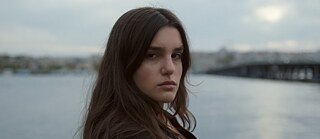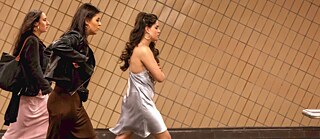Curator and critic Deniz Sertkol speaks with director Aslı Özarslan and author Fatma Aydemir about the process of adapting Aydemir’s novel "Elbow" into a drama. They share insights into the creative collaboration, character development, and the challenges of translating the book’s themes onto the screen. The conversation touches on the portrayal of complex female characters, cultural dynamics between Germany and Turkey, and the film’s engagement with timely social and political issues. The interview was conducted during the 74th Berlin International Film Festival.
Aslı Özarslan (AÖ): I’ve been deeply immersed in this project since 2018. When you carry a story in your mind for so long, write it down, bring it to life on set, and finally see it on the big screen, it’s both surreal and incredibly rewarding. The Berlinale is a festival with a large and diverse audience; seeing the sold-out theaters is exactly what you dream of as a filmmaker. Especially now, if I speak from [main character] Hazal’s perspective—a young woman navigating a complicated world full of wars, uncertainties, and a lack of opportunities for many people—, this film is a powerful way to highlight how some individuals in our society feel unseen or misunderstood.
DS: The film is based on Fatma Aydemir’s 2017 novel Elbow. How did this film come about, and what was your collaboration like?
AÖ: After finishing my documentary Dil Leyla, I came across the book cover of Elbow—a confident young woman staring back at me. I knew the author’s name, Fatma Aydemir, as a journalist for the taz (German daily newspaper), and I devoured the book. The character of Hazal instantly captivated me, I was absolutely certain that I wanted to adapt it into a film. When I naively reached out to Fatma, unsure if she would reply, she responded quickly because she had seen my documentary and wanted to connect. When I told her I envisioned a non-professional actress growing with the role of Hazal, Fatma liked the idea. It took some time, but eventually, we found our way to each other.
DS: Fatma, how was the collaboration for you?
Fatma Aydemir (FA): At the beginning, our discussions revolved around critical questions: What did Aslı find particularly interesting about the material, and what did she want to emphasize? Even before the novel was published, there was interest in adapting it, but one challenge was finding the right actors. Aslı’s idea of working with non-professionals, especially for the roles of Hazal and her friends, convinced me. We also wanted to ensure the Berlin-Istanbul narrative was well-executed. For example, the book ends with the night of the failed coup attempt, but we knew that wouldn’t work on screen. Hazal doesn’t fully grasp what’s happening, and that ambiguity wouldn’t translate well in the film.
Additionally, I didn’t want Istanbul to be romanticized, as is the case in many films. We had many discussions about how to portray certain characters, like Halil, and whether we should cut out some political elements. But ultimately, we found common ground and worked closely on the script. I read multiple drafts, and while we didn’t always agree, Aslı and Claudia [Schaefer, Özarslan’s co-screenwriter] took my feedback to heart. By the final version, I was entirely on board.
AÖ: Our discussions were quite enjoyable. We made some decisions based on visual impact, especially when I had a powerful image in mind. Fatma trusted us, allowing us to depart from the book while remaining true to Hazal’s character. I loved that we could do that.
DS: Was there ever an idea to use a voiceover, given the strong narrative voice in the book?
AÖ: Never. The novel’s language is so powerful that trying to carry it over directly would’ve been a disaster. We had to find our cinematic way of telling the story. I had favorite lines from the book that I pinned up because they helped me understand Hazal’s character, but they didn’t work in the film. Fatma agreed that what works in the book doesn’t always work in a script. Maybe another filmmaker could have pulled off a voiceover, but I was fascinated by Hazal’s sharp observational skills and ability to say “no” to things. She doesn’t know what she wants but knows exactly what she doesn’t want, and that’s what we kept coming back to.

Melia Kara in “Elbow“ (2024). Director: Aslı Özarslan | Photo (detail): © Haydat Tastan, Achtung Panda!
DS: Fatma, was it important for you that the filmmaker shared a similar background to yours?
FA: Yes and no. I was skeptical when I received inquiries from older white men. I wanted the director to be a woman, or at least not a cis man, but I didn’t need them to have the same background as me. What reassured me about Aslı was her aesthetic vision. I had seen her documentary Dil Leyla, and while documentaries differ from fiction, I could tell what was important to her as a storyteller. Also, when it came to dealing with the topic of Kurdistan, which isn’t the book’s central theme but is still significant, it was crucial that politically we were on the same page. We didn’t have to debate those issues, which made our collaboration smoother. A director’s political stance is more important to me than where their parents come from.
DS: How does it feel to see your book on screen now, especially given the current political climate in Germany, including discussions here at the Berlinale, a platform often used to address social and political issues?
AÖ: The Berlinale is a very public-facing festival, and I think that’s incredible. The positive feedback from other filmmakers has been great, but the reactions from the general audience matter most. What I’ve noticed is that the film resonates strongly with young people. Many young women have expressed gratitude for seeing a movie from their perspective, which really moved me. But I’ve also received feedback from older male viewers who felt confused by the film’s themes.
FA: The story in Elbow triggers people because it doesn’t offer a moralistic viewpoint. There’s a discomfort in confronting Hazal’s character, and that’s intentional. But it leaves some people feeling unsure of how to react to her. One critic recently said the film doesn’t seem to know how to position itself toward Hazal, and I thought, no, you don’t know how to position yourself. The film knows exactly where it stands. But this uncertainty, not knowing how to deal with her—makes the story powerful, especially in today’s political climate where the far-right is gaining strength.
AÖ: I completely agree. Beyond the political elements, what drew me to the story was how cinematic Hazal’s character is. Cinema should make people think and leave space for their own interpretations. Hazal is a complex, multi-dimensional character, which makes her very compelling for the big screen. I didn’t want to defend her; Hazal didn’t need our help. She defies categorization, and that’s the beauty of it.

Melia Kara in "Elbow" | © ACHTUNG PANDA!
DS: As German-Turkish artists, when you deal with sociopolitical topics regarding German-Turkish relationships, you automatically draw attention. Fatma, you’ve worked on "Faust" for the theater, a classic German story. How do you see your roles in stepping outside of the themes often associated with your own cultural background?
AÖ: I try to follow my gut instinct. A character like Hazal and her uncompromising nature draws me to a project. Right now, I’m working on something completely different: a story about a character undergoing a transformation. It’s not tied to the same themes as Elbow, but it’s the cinematic challenge that excites me. People have tried to label the film “migrant cinema,” but Elbow isn’t migrant cinema—it’s European cinema. It deals with marginalized people trying to find their place in a society that often pushes them to the edges. These are the kinds of stories that interest me.
FA: It’s a double-edged sword. After Elbow, people told me I needed to prove myself by writing something completely different. There’s a strange assumption about my literary abilities. But at the end of the day, it’s about telling stories that have yet to be told. I’ll write what interests me, regardless of genre or background.
As for Faust, it was a commission for the theater, and I found it amusing. I took the structure but crafted my own story around it. In my version, Faust is a woman who seduces a Moroccan student who is actually gay, but she pursues him anyway. It’s a bizarre, comedic love story, but at its core is the universal theme of making moral choices in a corrupt world. And, of course, the “Germanness” of Faust is something you can poke fun at, especially in today’s political climate.
AÖ: That sounds amazing! I can’t wait to see it.
DS: Let’s go back to "Elbow"—and delve deeper into the characters. We have Hazal’s internal voice in the book, but in the film, we don’t. Instead, we see how Hazal speaks in Germany versus how she speaks in Istanbul, and it’s quite different. She’s tough and smart in Germany, but in Istanbul, she becomes more reserved, almost naive. Can you tell us how you developed this character with Melia Kara? How much came from her, and how did you work on the language?
AÖ: A lot of it was already set in the script, and Melia is quite different from Hazal. She would never act the way Hazal does, and that was something we discussed at length. However, Hazal’s emotions are something Melia knows well. That was the most crucial aspect for me during the six months we worked together. We didn’t focus too much on rehearsing scenes; she didn’t even see many of them for a long time. Instead, we worked through improvisation. The goal was to build a backstory for Hazal, drawing from the novel and inventing new elements. We walked around Berlin’s Wedding district, and she imagined where Hazal might live and what her favorite playground was. Along with the other actors, they invented childhood memories. Through this process, Melia gradually became Hazal.
I also told her, “You may find it hard to understand why someone like Hazal acts the way she does. But every person has their own reasons for their behavior, even if it seems strange from the outside. We need to find Hazal’s reasons.” That was a significant turning point. Melia needed to learn how to love the character. Only then could she truly free herself to embody Hazal. We only read the script towards the end of our process.
At that point, Melia and the others started fine-tuning their lines, saying things like “No one talks like this anymore,” and changing them. Sometimes, she would add or skip lines during filming, which was fine. When we think about Hazal in Istanbul, she learns a lot, especially about the Kurdish issue, but she’s not as naive as she might first appear. In fact, she shows a certain maturity, like when she stands up to Halil. One of the most important lines is, “Just because I don’t know where Mardin is, doesn’t mean I’m naive.” For the first time, Hazal dares to defend herself. She’s judged in Germany and then judged again in Turkey, and almost no one takes her seriously. But there’s this moment with Halil, where he asks her to read his writings. He starts asking her questions, and suddenly, they’re on equal footing. She feels seen, and that’s what it’s all about—Hazal wants to be seen. We wanted to savor that, so we added scenes like the bird competition to show that, despite everything, she has beautiful moments. We wanted to reveal Hazal as a young woman with immense potential.
DS: Let’s talk more about the characters of Halil and Gözde. Could you explain their significance for an international audience?
AÖ: Both in the novel and the film, different female characters share similar backgrounds but have grown up very differently. That complexity is fascinating. Gözde, for example, belongs to what I interpreted as a left-wing elite, which is something I’ve encountered in Turkey. People who may not have a Kurdish background themselves but want to be part of the Kurdish leftist movement because it’s “cool.” Of course, some activists take it very seriously, but Gözde comes from a more privileged background. Showing her in contrast to Hazal, who comes from the working class and is patronized by Gözde, was fascinating.
FA: Halil is a Kurdish student, intellectual, and politically active. He writes government-critical texts, especially about the Kurdish freedom movement. The police eventually seek him out, and when he gets arrested, Gözde distances herself from him, retreating into her more privileged life. For Hazal, watching this unfold gives her insight into the society she’s navigating.
DS: The character of Mehmet references the real-life “Mehmet case” from 1998, where a 14-year-old petty criminal was deported from Germany to Turkey. Can you explain this connection?
FA: Yes, that was a nod, a wink, to all the people sent back to a country they don’t know due to petty crimes. It’s a common phenomenon.
AÖ: Mehmet’s character moved me, even in the novel, because he’s so broken. I could deeply empathize with him. Imagine being forced to leave your home, language, and everything you grew up with and going to a foreign country. When the state says, “You don’t belong to Germany; you’re not one of us,” and then you arrive in a place you know nothing about—it destroys him to be in Turkey. But he tries to hide it. He calls it a cosmic mistake that he was born in Germany. But you can see in everything he does that he genuinely doesn’t belong there, and that’s what touched me the most.
DS: One last question. The film has an open ending. What does that ending mean to you? What do you hope the audience takes from it?
AÖ: I wanted to create a character who becomes strong and makes their own choices. Hazal says “no” again, but it’s her own decision this time. That’s what fascinated me. And that’s why I wanted her to look directly at the camera, throwing the question back at society: What now?
